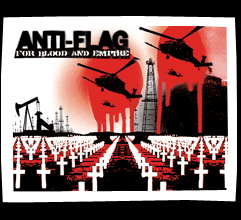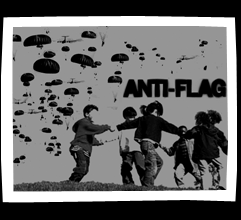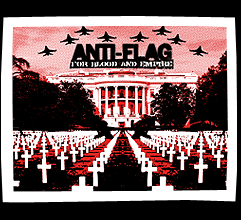 Kill the Protester
Kill the Protester Violence is a very powerful force. It’s a surefire way to get attention. It’s all around us: it’s on the television, it’s in our magazine ads, and it’s in the music we listen too. Violent imagery stirs emotion. Most of the time, however, violence is used to oppress people. Violence is used to scare dissenters into submission. Like the bully on the schoolyard, organizations that use violence as a way of maintaining power often do so because of a weakness within the organization. Take for example the factory that uses violence to break strikes. The factory needs the workers more than the workers need the factory, just as the bully on the schoolyard needs the smaller kid to push around. Without someone to push around a bully is just any other kid. Without a production line full of workers, a factory is just another vacant building.
At the right time and the right place violence can be used to motivate. It’s something that can make us think and feel. Authors can use violence to make a comment about society. Take for example the way Chuck Palahniuk comments on the destructive and shallow aspects of our capitalist society, in his book Fight Club. Artists use violent images all the time to make us consider the world around us. Take for example British graphitti artist Banksy. In one image he can combine the violent nature of a protest with a message of peace. Musicians often draw on violent imagery. Sometimes it’s used to show despair and loneliness. Listen to the words of your favorite Alkaline Trio song to see what I mean. Other times, musicians use violent imagery to show the frustration many of us feel inside. You Can Kill The Protestor, But You Can’t Kill The Protest, is a fine example of this.
The point of all of this is to realize that although violence can be powerful in the fact that it stirs emotion, it does very little in the way of change. Change comes through ideas. Change comes through philosophy, through education, through discussion and human interaction. Change is not a result of violence. So while the powers that be may use violence to try to force you into changing your mind, as long as you understand that while violence can be very powerful, it is also extremely delicate, their actions will have little result on your ideas.
 When You Don't Control Your Own Government People Want to Kill You
When You Don't Control Your Own Government People Want to Kill You"When you sow the wind, you reap the whirlwind." No phrase better sums up the result of US foreign policy over the last 50 years. People all over the world resent US military intervention in their countries that has left countless people dead. At least 88,000 civilians were murdered by American-backed death squads in El Salvador and Nicaragua during the 1980's, and the BBC reports 3,800 civilians were killed in the five months long US aerial bombing campaign in Afghanistan in 2001.
Under President George W. Bush, current US foreign policy is nicely summed up in the policy paper written in the 1990's by The Project For a New American Century (PNAC), whose authors include senior Bush Administration officials including Paul Wolfowitz and Vice President Dick Cheney. The strategy outlined by PNAC was a plan to make the US the sole world super power by controlling Middle East oil through invasion of Iraq and Iran, for a start. PNAC also planned to kick North Korea's ass into oblivion (Axis of Evil anyone?) PNAC recognized that implementation would be a difficult sell to the American people, and that a "Pearl Harbor-like event" would be necessary to implement their scheme; then came 9/11. Under the guise of combating terror, and promoting freedom and democracy, their reactionary political agenda is being executed.
Countries like North Korea, and organizations such as al-Qaeda, use this outrageous US policy as justification for nuclear proliferation and terror acts such as 9/11. The illegal US invasion and occupation of Iraq has only added fuel to the fire of their arguments. As long as the US government embraces such reckless foreign policy, countries like North Korea and organizations such as al-Qaeda, rightly or wrongly, will use it as justification to threaten and kill American citizens as well as citizens of nations whose governments support and benefit from it. In the end, it us up to us, the citizens of all nations, to pressure our governments to implement and participate in humane foreign policy. If we do not do this, we can only expect terror and suffering abroad and at home.
 Death of a Nation
Death of a NationI really wanted to write the essay for Death of A Nation, because it's about something that is near and dear to my heart: the youth of America. How many times have you heard that the youth of America are the worst ever? That they're lazy, selfish, and uninterested? Or worse yet, that they're not to be trusted, they're dangerous, and they should be feared? You've heard it as much as I have, if not more, and to be perfectly honest, it pisses me off!!!
One reason why all this criticism of America's youth pisses me off is that almost all of the so-called 'failings' of modern American youth (if indeed not all of them) can be placed squarely at the feet of adults, and the institutions they endorse and run, that are failing the youth each and every day. People are aghast and horrified when children as young as six go to school and shoot their classmates. And you know what? They're right to be horrified. They SHOULD be horrified. But all too often the wrong questions are asked and the finger of accusation is pointed in all the wrong places.
Remember the Columbine shooting? Two seniors who were within weeks of graduating went to school and killed and injured fellow students and teachers with automatic weapons and homemade bombs. Then they then killed themselves. Before the dust had even settled we heard about a group of kids at the school called The Trenchcoat Mafia. These kids wore black clothes, dressed kind of "funny" by mainstream standards, were almost universally considered losers by everyone else at the school, and (again almost universally) picked on and bullied. The existence of such a group at the school was blamed for what happened. Think about that. The existence of that group of kids was, from the vast majority of news coverage I saw and read, blamed for what happened. Our educational system wasn't blamed all that much, nor was a school administration so out of touch with what was going on at Columbine High that the principal didn't even know there was a group of students called The Trenchcoat Mafia. The shootings were the first that he'd heard of them.
Where were the conversations about why there are students at any school who are considered outcasts? Where were the conversations about bullying and a school system that by and large doesn't take this serious and endemic problem seriously? Where were the conversations about how big some of our high schools have become, and that maybe having 1500 students in one building might be kind of alienating? That schools that big make it easier for students who most need help to fall through the cracks? Where were the conversations about out-of-touch school administrators who don't know what is going on in their school? Where were they? There were some stories about bullying and how destructive and harmful it is. And there were some stories about how easy it is to get guns even if you're too young to buy them legally, but not enough, and not for long enough. There weren't any conversations about how our culture seems to accept that one group of people victimizing another is just the way it is… that it's always been that way and there's nothing we can do about it? And the people who should have been initiating these conversations are the adults. Adults are in charge, or at least they're supposed to be, and it's their responsibility to recognize and fix problems. And the first step to fixing such problems, other than acknowledging them, is to actually listen to what our youth have to say.
I am bone weary of hearing about how the youth of America are self-absorbed, selfish, and apathetic about the world around them. Whenever I hear stuff like this I wonder just how many years it's been since whoever is spouting such nonsense has talked to someone under 21? A few years back a teen ran in the Mayor's race here in Pittsburgh. I didn't live here then, but a lot of my family did, and the mom of my brother's girlfriend helped run his campaign. My brother told me that the response of the political establishment and mainstream, corporate media in my admittedly not exceptionally progressive hometown was to tell this young man to go home and leave important things like politics to the grown ups. They dismissed him out of hand because he wasn't a forty-five year old lawyer or city councilman, and yet many of the very same people will beat their breast about how the youth of America don't care about anything but the party this Friday night. It may just be that I'm a little slow, I dunno, but what they're saying is that young people are supposed to be involved and active in their communities, but only when it doesn't interfere with how the powers that be think it should? What kind of mixed message is that? If that isn't enough to make you go home, crack open a Pepsi or three and hit M-TV for seven hours solid, I don't know what is.
The youth I hear from every single day here at UAA are some of the most amazing, interesting, and involved people there are. They're doing a hell of a lot more than I was when I was in school. They not only care about what is happening in the world around them; they're getting off their asses to do something! I've heard from teens in LA that started a human rights group at their school. I've heard from teens in the Mid-West who successfully defended their free speech rights at school. I've heard from teens who are organizing an alternative paper at their schools, who are protesting war and violence, who are looking for guidance to set up a Gay/Straight Alliance in their community, who are getting involved in movements from anti-sweatshop to living wage to the environment and beyond. So don't tell me that the youth don't care when they get shut down, let down, and put down by the adults around them. Don’t even waste my time.
by Anne Geever, Nov. 2003
 O.I.L. (Operation Iraqi Liberation)
O.I.L. (Operation Iraqi Liberation)It wasn’t that long ago that we all saw the images on our television screens. I remember them rather vividly. I was getting ready for school and as I did everyday last spring, I turned on the news to see what was unfolding in Iraq. There they were American tanks rolling into Baghdad. I thought to myself, this is much like the images I saw on September 11th, 2001. The world was changing right before my eyes.
The media does a good job at painting vivid images. I don’t necessarily think that’s how everything necessarily happens. As tanks rolled into Baghdad we saw images of people celebrating in the street. Iraqi citizens helping U.S. soldiers topple a statue of Saddam Hussein. I guess that’s what images of liberation look like. Or is it? What about this image? Between April 13th and August 31st, there have been 2,846 violent deaths documented by the Baghdad morgue. In mid-April there were about 10 violent deaths a day, by mid-August the number had reached 28 violent deaths a day. I can’t imagine there is much celebration in the streets now. Where has the U.S. been? We’ve toppled Saddam’s regime, but we have done little in restoring order and peace to the so called “liberated” citizens of Baghdad.
Now, I’m no fan of governments that control their citizens through fear. Removing Saddam from power is a good thing. I’ve adopted this fairly simple philosophy: dictators = bad. However, we cannot march into a country waving the flag of liberation, destroy an existing government and then leave the citizens with very little. Many of the violent deaths that have taken place between April and August have been a result of Iraqi on Iraqi violence. The citizens of Baghdad have been left to live in a city without order. It’s literally chaos in the streets. The people of Iraq lived under harsh rules for so long. The police force that once maintained order is now non-existent, and we’re doing very little in trying to restore order. The UN has resolved that it is the responsibility of the US and the UK to restore and maintain order in Iraq. Being that the US and the UK are the only occupying force in Iraq with the ability to do so, I don’t think the UN is asking for too much from our governments. What have we done? We’ve left soldiers, American citizens who aren’t much different from you or I, thousands of miles away with the job of policing a country that they know very little about. We’ve left them to protect the same people we sent them to kill.
I know it’s easy for me to criticize. Here I am sitting behind a computer in Pittsburgh. I’m not out on the streets in Baghdad dealing with the chaos we’ve left behind. Then again, the people in power in Iraq are not far away. While I’m sitting here in a library in PA, they are sitting in their offices and conferences in D.C. I’ve always been under the assumption that when you set out to do a job, it’s generally a good thing to finish it. When faced with a problem it’s better to resolve it rather than ignore it. With estimates of civilian casualties somewhere between 7,390 and 9,193, I’m wondering just what are those people in Power doing? Just out of curiosity I looked up the definition of “liberate”. Using Merriam-Webster Online, I found this definition:
LIBERATE: 1 : to set at liberty : FREE; specifically : to free (as a country) from domination by a foreign power 2 : to free from combination 3 : to take or take over illegally or unjustly
It’s pretty interesting that the definition of liberate ranges from setting free to taking over unjustly. Maybe we have done what we set out to do. Our government set out to liberate Iraq. This entire time I thought they meant to free the people of Iraq; I guess it was just a misunderstanding. All along they were using the other definition of liberate... to take over unjustly.
by Jake Reinhart, Nov. 2003


No comments:
Post a Comment